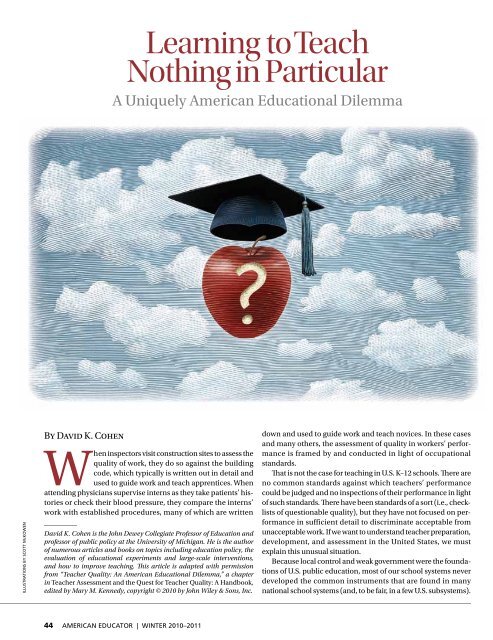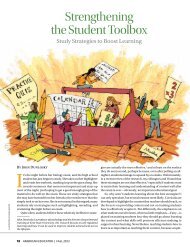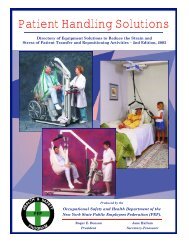American Educator, Winter 2010-11, Vol. 34, No. 4, AFT
American Educator, Winter 2010-11, Vol. 34, No. 4, AFT
American Educator, Winter 2010-11, Vol. 34, No. 4, AFT
You also want an ePaper? Increase the reach of your titles
YUMPU automatically turns print PDFs into web optimized ePapers that Google loves.
ILLUSTRATIONS BY SCOTT MCKOWEN<br />
By David K. Cohen<br />
Learning to Teach<br />
<strong>No</strong>thing in Particular<br />
A Uniquely <strong>American</strong> Educational Dilemma<br />
When inspectors visit construction sites to assess the<br />
quality of work, they do so against the building<br />
code, which typically is written out in detail and<br />
used to guide work and teach apprentices. When<br />
attending physicians supervise interns as they take patients’ histories<br />
or check their blood pressure, they compare the interns’<br />
work with established procedures, many of which are written<br />
David K. Cohen is the John Dewey Collegiate Professor of Education and<br />
professor of public policy at the University of Michigan. He is the author<br />
of numerous articles and books on topics including education policy, the<br />
evaluation of educational experiments and large-scale interventions,<br />
and how to improve teaching. Th is article is adapted with permission<br />
from “Teacher Quality: An <strong>American</strong> Educational Dilemma,” a chapter<br />
in Teacher Assessment and the Quest for Teacher Quality: A Handbook,<br />
edited by Mary M. Kennedy, copyright © <strong>2010</strong> by John Wiley & Sons, Inc.<br />
44 AMERICAN EDUCATOR | WINTER <strong>2010</strong>–20<strong>11</strong><br />
down and used to guide work and teach novices. In these cases<br />
and many others, the assessment of quality in workers’ performance<br />
is framed by and conducted in light of occupational<br />
standards.<br />
Th at is not the case for teaching in U.S. K–12 schools. Th ere are<br />
no common standards against which teachers’ performance<br />
could be judged and no inspections of their performance in light<br />
of such standards. Th ere have been standards of a sort (i.e., checklists<br />
of questionable quality), but they have not focused on performance<br />
in sufficient detail to discriminate acceptable from<br />
unacceptable work. If we want to understand teacher preparation,<br />
development, and assessment in the United States, we must<br />
explain this unusual situation.<br />
Because local control and weak government were the foundations<br />
of U.S. public education, most of our school systems never<br />
developed the common instruments that are found in many<br />
national school systems (and, to be fair, in a few U.S. subsystems).





